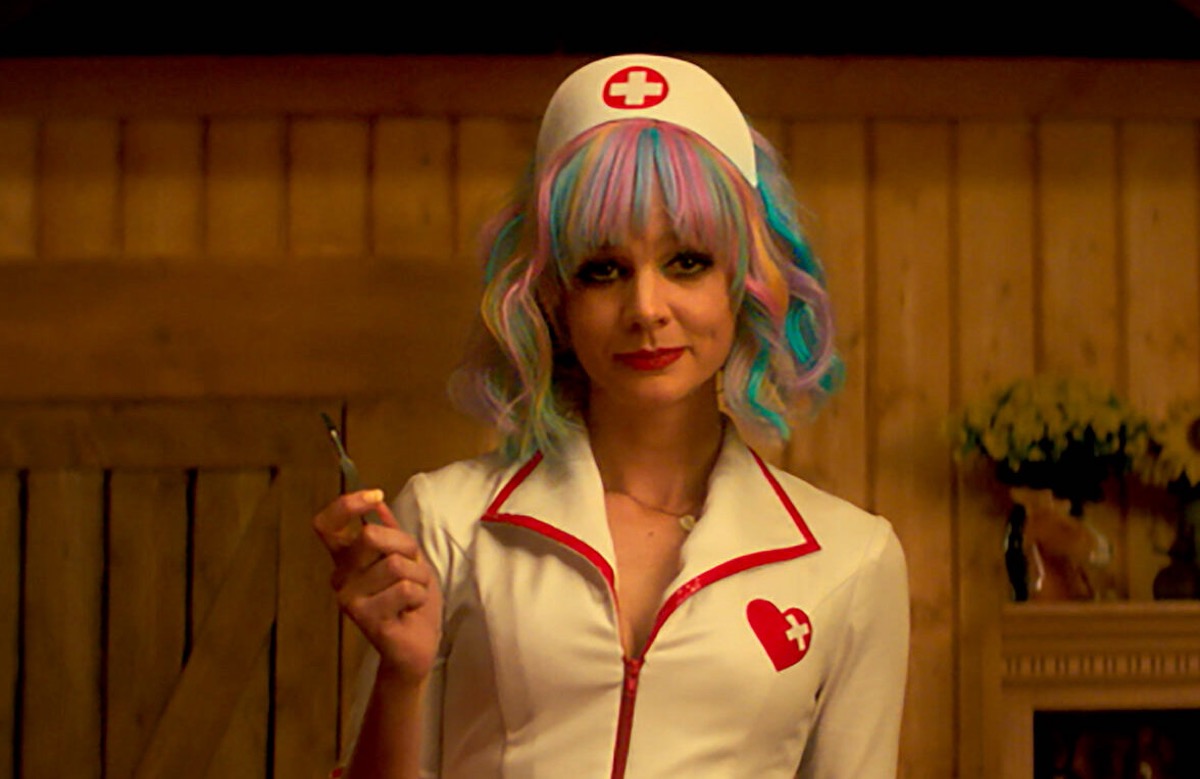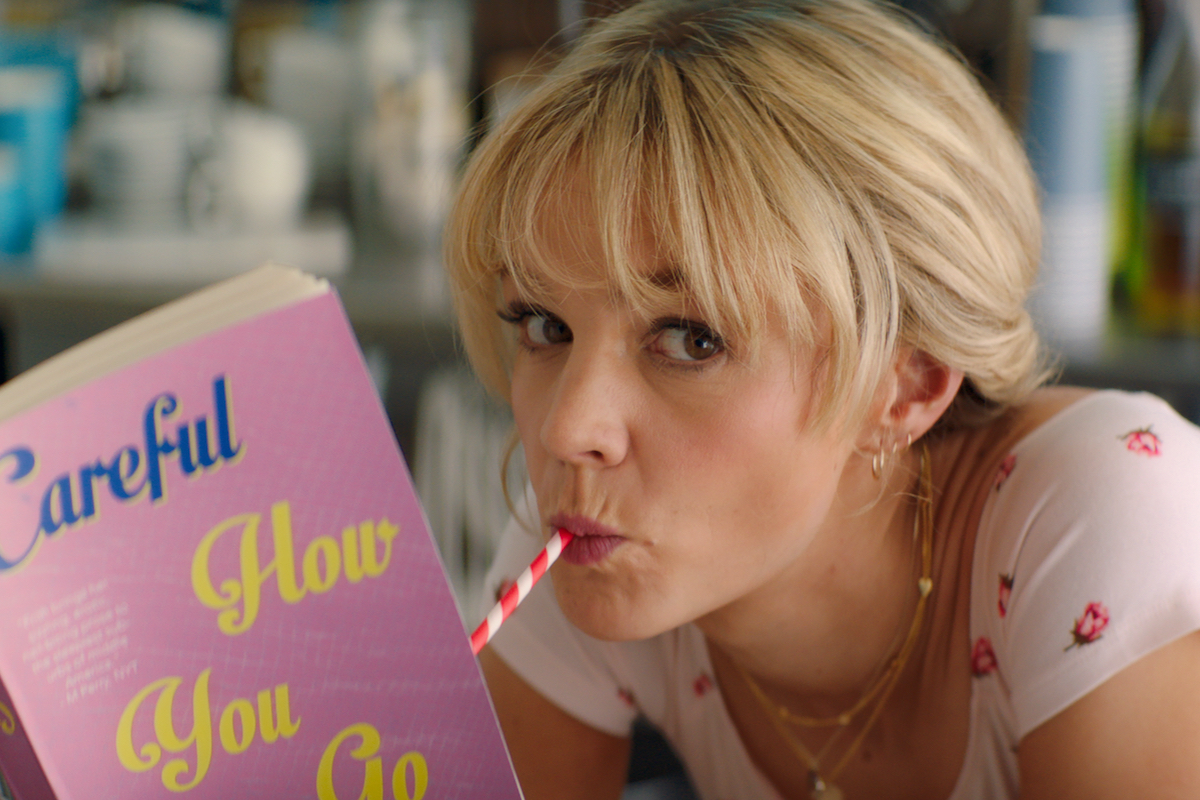Friendship Goals: Girlie Vigilantism in Emerald Fennell’s Promising Young Woman

SPOILER ALERT: This post discusses the ending of Promising Young Woman and features several spoilers.
Emerald Fennell’s new feature film Promising Young Woman is visually stunning, tightly written, and even though it masquerades as a rape revenge fantasy horror film (which it is), it’s more so a love story. I don’t mean that it’s a romantic comedy—it is certainly not that—but it’s a film about the family you choose, your lifelong friends.
Often, when it comes to horror movies, someone asks, “What would YOU do in that situation?” Women horror aficionados that I know across the board have widely reacted with, “Die, probably.” But when asked, “What would you do if someone you love was in that situation?” everything changes. Blame the culture we live in or the established horror movie convention, but women at large care about the people they love more than they care about themselves, and Promising Young Woman is one of the few films I’ve seen that truly illuminate that kind of corroding selflessness. (I should mention that, from here on, spoilers get pretty intense. If you haven’t seen the film, go watch it, and then come back. We’ll be here.)
I think the most accurate aspect of this movie is the guilt that Cassie (Carey Mulligan) feels. After her childhood best friend Nina (not represented onscreen) is raped while blackout drunk at a party, she drops out of medical school. Cassie drops out, she says, “to take care of her.” Cassie’s life falls apart because Nina’s life falls apart; she can’t be okay with the fact that something atrocious happened to someone she loved, and she especially can’t handle the fact that she feels like she could have prevented it from happening. Of course, the rape is not the fault of Cassie or Nina, but the culpability Cassie feels really solidifies their friendship for the viewer. It is unending, even after death.
The visual component of this film reflects the beginning of Cassie and Nina’s friendship, and while it might seem to reflect Cassie’s stunted development, it seems, to me, more like mere nostalgia for a time when Nina was around, and healthy, and happy, and herself. After all, when considering Cassie’s regression into vivid hues and childlike braids, we have to consider that both girls made it to, and almost through, medical school—it’s not like they were wearing scrunchies and carrying Lisa Frank trapper-keepers to their neurology classes in 2009.
That said, whereas we usually see in film a sort of Freudian “sexy baby” approach (see Harley Quinn), which is particularly put-on when trying to disarm potential targets, that’s not really what Cassie does in this film. When she’s out as a predator, she looks very adult (press-on eyelashes, hair extensions, stilettos, skirt suits, sequins, and she even watches a YouTube makeup tutorial for “blowjob lips”). It’s when Cassie is at home, or just relaxing as herself, that she indulges in hair ribbons, multicolored nails, fuzzy sweaters, and granny dresses.
The irony of this wardrobe is that Cassie is anything but a child. Her voice is heavy, and her spirit is not lighthearted. Her character does not match her wardrobe, which is a really interesting stylistic choice. The second layer of irony comes in that Cassie dresses in childlike colors and styles, but she is the only one who does not blame her actions on her youth: “I was a kid!”
Maybe her nostalgia is somewhat regressive, but when she visits Nina’s mom (Molly Shannon), Mrs. Fisher tells Cassie to move on, and she does try to. Cassie tries to defend her stagnation by saying, “I’m just trying to fix it.” Mrs. Fisher says, “You can’t, Cassie.” So, she does try to move on, which is, of course, the best one can hope for when a series of cascading failures follows a trauma like the one Nina endured, and which Cassie endured by proxy. You can never really get over something that intense; the best you can hope for is to get through it.
So, Cassie tries to move past her vigilante justice. She throws the notebook full of tally marks into the trash, and she dives into her relationship with Ryan (Bo Burnham). Then, she receives the video of the rape, and with it comes the wave of horror at realizing her boyfriend whom she loves was complicit in Nina’s rape. In the model of true friendship, Cassie reverts immediately to Nina’s corner, blackmailing her boyfriend with the video for the location of Nina’s rapist’s bachelor party.
Her plan for the ultimate justice is pretty airtight, but what she doesn’t anticipate is that even though her bond with Nina is unbreakable even past both of their deaths … the boys have that bond, too. When Joe (Max Greenfield) wanders into Al Monroe’s (Chris Lowell) bedroom the morning after his bachelor party, he first reacts to Cassie still being in bed with Al the morning after his bachelor party by saying, “[Your fiancée] is never going to find out. What happens on tour stays on tour.”
It takes him several seconds to realize that Cassie is dead. When Al tries to confess to the murder, Joe scoffs and says, “You killed the stripper at your bachelor party? What is this, the ‘90s? Al. Classic.”
I’d like to very quickly also express my gratitude at not seeing Cassie’s dead face. In fact, much of the violence towards women that this movie explains happens offscreen, and as a woman viewer, I really appreciated that. We know it happens without seeing it—and the intended audience of this film does not have to see the violence happening to understand its magnitude. In fact, it happening offscreen lends to its authenticity. We are never even told exactly how Nina died. And after Cassie’s murder, we only see the makeup smears on the pillow.
After leaping away and swearing, Joe goes silent for a moment, to process, and then he says to his best friend, “Al, this is not your fault.” Even when Al tries to say, “I don’t know, it kind of seems like it was,” he interjects, saying, “Hey, it was an accident, right?” and then reiterates that it was an accident again.
He takes care of Al the way that Cassie takes care of Nina, except that by doing so, Joe doubles down on the absolute evil that can happen when groups of shitty dudes hold it down for each other. He literally helps Al hide the body, and Joe is the one who tosses the wig on the fire and moves Casse’s decomposing, bruised hand back into the kindling. Afterward, at the wedding, Joe says, “Al’s like a brother to me. We grew up together. We’ve been through thick and thin, and I just love him.”
I mentioned earlier that almost all of the violence against women happens offscreen. The one excruciating scene that we do see is when Al smothers Cassie to death. I think it’s especially important to notice the gaze during these moments: at first, our angle switches back and forth between that of Al and Cassie, but that time is short-lived.
The majority of the scene is viewed from across the room. We’re the spectator. It forces the viewer into discomfort because we are rendered mute. Not only can we do nothing to keep this from happening, but we are doing nothing to prevent this from happening, nor to get justice for those to whom it has happened. It puts the responsibility on the viewer because doing nothing to intervene is just as bad as acting with evil intent.
Cassie’s pursuit of justice was all that kept her going. When we watch her die, we feel as though she failed—and I for one was expecting the sort of fake-out death so common in thriller films, but no, she was actually murdered. She falls on the grenade to get that justice for her friend, literally sacrifices herself so that Nina’s rapist will finally be connected to the crime, because that’s what was important to her. She goes down with the ship.
Though Joe wanted to help his best friend Al evade his punishment, when the police do show up at his wedding, Joe takes off into the woods, literally fleeing the scene. One thing this movie tries to highlight is the culturally gendered difference in action: While women may get discouraged when seeking justice for ourselves, we will stop at nothing to get justice for people we love.
(images: Focus Features)
Want more stories like this? Become a subscriber and support the site!
—The Mary Sue has a strict comment policy that forbids, but is not limited to, personal insults toward anyone, hate speech, and trolling.—
Have a tip we should know? [email protected]
